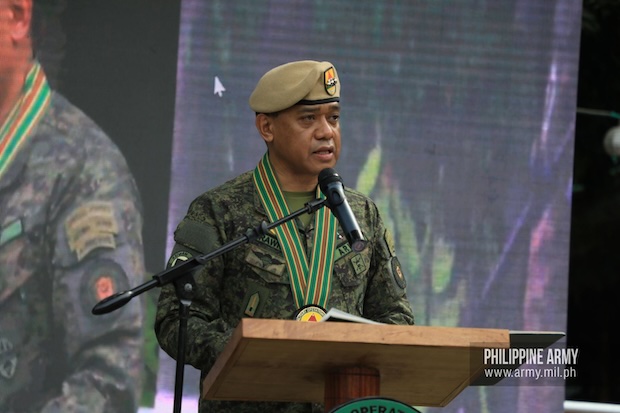Ayungin resupply still by boat despite China blockade try

Gen. Romeo Brawner Jr., AFP chief of staff (Photo from the Facebook page of the Philippine Army)
MANILA, Philippines — Armed Forces Chief of Staff Gen. Romeo Brawner Jr. said supplies to troops stationed at BRP Sierra Madre on Ayungin (Second Thomas) Shoal would continue to be transported by boat despite China’s repeated harassment of Filipino vessels conducting rotation and reprovisioning (Rore) missions.
According to Brawner, using airplanes to drop off supplies for military personnel on the grounded World War II ship that serves as the country’s military outpost poses logistical challenges and may not be viable.
“We have already tried that before, but the problem is that aircraft can only carry a few supplies,” he said in an interview on dzRH on Tuesday. “And our helicopters cannot travel from Palawan mainland to Ayungin. It is very far.”
In March 2014, the Department of National Defense confirmed that there was “an airdrop of food via an airplane for military troops stationed at BRP Sierra Madre to evade a blockade of Chinese sea vessels.”
Ayungin, which is 185 kilometers away from Palawan province’s Rizal town, is within the country’s 370-km exclusive economic zone. The shoal is more than 1,000 km from Hainan Island, the closest Chinese landmass, although Beijing claims nearly all of the South China Sea based on what it says are historical records.
Article continues after this advertisementPatrols to continue
Brawner’s statements, however, seemed to contradict what AFP spokesperson Col. Medel Aguilar said at the Bagong Pilipinas Ngayon briefing.
Article continues after this advertisementAccording to Aguilar, the AFP was considering other ways of conducting Rore missions to Ayungin Shoal following the two collisions that happened on Oct. 22 between Chinese ships and Filipino boats bringing supplies to BRP Sierra Madre.
“All those things are being considered, [even other modes of resupply], because what we want to accomplish actually is a successful Rore mission without interference from any party at all,” he told reporters although he did not give additional details.
Despite the collisions, Aguilar said the AFP would continue to conduct maritime patrols in the West Philippine Sea.
“Let our people and the rest of the world know that this incident will not deter us from doing what is right, what will benefit our people and what will support and strengthen the rules-based international order,” he stressed.
Call to US counterpart
On Monday, National Security Adviser Eduardo Año, also concurrent chair of the National Task Force for the West Philippine Sea, talked over the phone to his United States counterpart Jake Sullivan.
“Mr. Sullivan and Mr. Año reaffirmed the enduring alliance and friendship between our nations and discussed upcoming US-Philippine engagements and ways to further strengthen our close partnership,” the White House said in a press statement.
“Mr. Sullivan emphasized the ironclad US alliance commitments to the Philippines under the US-Philippines Mutual Defense Treaty (MDT), which extends to armed attacks on Philippine public vessels, aircraft, and armed forces—to include those of its Coast Guard—in the Pacific, including in the South China Sea,” it added.
Brawner, however, said that despite the collisions, it was not yet time to invoke the MDT.
While acknowledging that the incident was alarming, he pointed out that there were far “worse attacks” that

Gen. Romeo Brawner Jr., AFP chief of staff (Photo from the Facebook page of the Philippine Army)
would warrant the activation of the 72-year-old defense treaty, such as “a deliberate attack on our Philippine ships or an attack on our territory.”
‘Stop smearing’ China
China’s Ministry of Foreign Affairs (MFA), on the other hand, accused the Philippines of always intruding into its territory as it called on the government to “stop attacking and smearing” Beijing.
“[The Chinese] Embassy in the Philippines have made serious démarches to the Philippines on its act of infringement. It is the Philippines who needs to stop provocative actions,” MFA spokesperson Mao Ning said in response to the collisions.
Insisting that most of South China Sea, including the West Philippines Sea, was part of Beijing’s territory, Mao said that its coast guard “exercised utmost restraint and patience” even as Manila ignored China’s “goodwill and sincerity.”
Meanwhile, alumni of the National Defense College of the Philippines (NDCP) under the Department of National Defense called on Filipinos to rally behind the government in the face of growing tension with China.
Speaking on the group’s behalf, Capt. Aldrin Cuña, NDCP Alumni Association Inc. secretary general, said that “not only is it our right but our duty to protect it when parties launch aggressive acts to challenge our sovereignty and curb our activities over what is legally ours.”
“The West Philippine Sea is of great importance to our nation, future, and children — their inheritance. We should not lose it during our watch,” he added.
For comprehensive coverage, in-depth analysis, visit our special page for West Philippine Sea updates. Stay informed with articles, videos, and expert opinions.